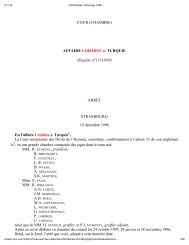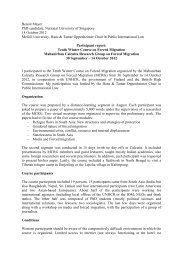Paschim banga Khet Samity v. State of West Bengal, Case No. 169 ...
Paschim banga Khet Samity v. State of West Bengal, Case No. 169 ...
Paschim banga Khet Samity v. State of West Bengal, Case No. 169 ...
You also want an ePaper? Increase the reach of your titles
YUMPU automatically turns print PDFs into web optimized ePapers that Google loves.
hospitals and that ambulance should have all the facilities necessary for giving primary<br />
medical aid and treatment to the patients. Shri Dhavan has submitted that the emergency<br />
units at the hospitals should be fully equipped to manage all the emergency cases and the<br />
medical <strong>of</strong>ficer should be available there round the clock. Shri Dhavan has urged that the<br />
denial <strong>of</strong> treatment to a patient should be specifically made a cognizable <strong>of</strong>fence and<br />
further it should also be made actionable as a tort. In this context Shri Dhavan has invited<br />
our attention to the recent developments that have taken place in this field in the United<br />
<strong>State</strong>s. There it was found that private hospitals were running away uninsured indigent<br />
persons in need <strong>of</strong> urgent medical care and these patients were <strong>of</strong>ten transferred to, or<br />
dumped on public hospitals and the resulting delay or denial <strong>of</strong> treatment had sometimes<br />
disastrous consequences. To meet this situation the U.S. Congress has enacted the<br />
Consolidated Omnibus Budget Reconciliation Act <strong>of</strong> 1986 (for short 'COBRA') to<br />
prevent this practice <strong>of</strong> dumping <strong>of</strong> patients by private hospitals. By the said Act all<br />
hospitals that receive medicare benefits and maintain emergency rooms are required to<br />
perform two tasks before they may transfer or discharge any individual; (i) the hospital<br />
must perform a medical screening examination <strong>of</strong> all prospective patients, regardless <strong>of</strong><br />
their ability to pay; (ii) if the hospital determines that a patient suffers from an emergency<br />
condition, the law requires the hospital to stabilize that condition and the hospital cannot<br />
transfer or discharge an unstabilized patient unless the transfer or discharge is appropriate<br />
as defined by the statute. Provision is made for imposing penalties against hospitals or<br />
physicians that negligently violates COBRA. In addition the individual who suffers<br />
personal harm as a direct result <strong>of</strong> a participating hospital's violation can bring a civil suit<br />
for damages against the hospital. According to Shri Dhavan the standard <strong>of</strong> care in<br />
emergency cases implies three obligations, viz., (i) screening the patient; (ii) stabilizing<br />
the patient's condition; and (iii) transfer or discharge <strong>of</strong> the patient for better treatment.<br />
The submission <strong>of</strong> Shri Dhavan is that emergency health services in our country must be<br />
provided keeping in view these three requirements.<br />
15. We have considered the aforesaid submissions urged by Shri Dhavan. Apart from the<br />
recommendations made by the Committee in that regard and the action taken by the <strong>State</strong><br />
Government in the memorandum dated August 22, 1995 on the basis <strong>of</strong> the<br />
recommendations <strong>of</strong> the Committee, we are <strong>of</strong> the view that in order that proper medical<br />
facilities are available for dealing with emergency cases it must be that:<br />
1. Adequate facilities are available at the Primary Health Centres where the patient can be<br />
given immediate primary treatment so as to stabilize his condition;<br />
2. Hospitals at the district level and Sub-Division level are upgraded so that serious cases<br />
can be treated there;<br />
3. Facilities for giving Specialist treatment are increased and are available at the hospitals<br />
at District level and Sub-Division level having regard to the growing needs;<br />
4. In order to ensure availability <strong>of</strong> bed in an emergency at <strong>State</strong> level hospitals there is a<br />
centralise communication system so that the patient can be sent immediately to the<br />
hospital where bed is available in respect <strong>of</strong> the treatment which is required;

















